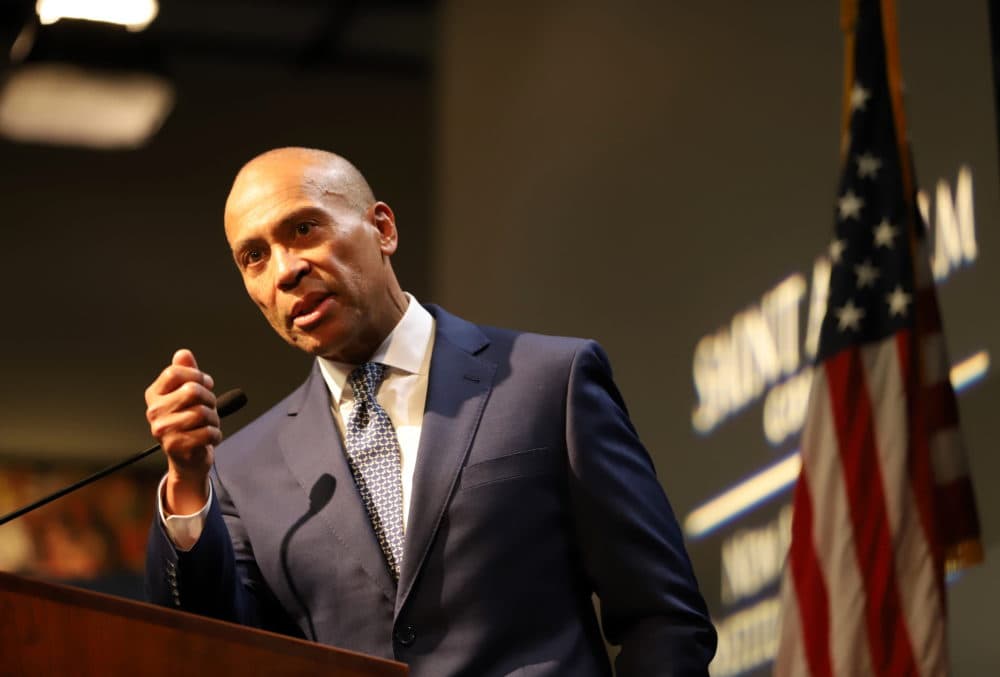Advertisement
Patrick Says He Learned 'Give And Take' On Beacon Hill

Former Massachusetts Gov. Deval Patrick leaned heavily on his experiences on Beacon Hill Monday while discussing solutions to issues he would encounter if he's elected president.
Patrick, speaking at a breakfast forum at Saint Anselm College in Manchester, New Hampshire, said he is proud of the work he accomplished while serving as governor from 2007 through 2014, pointing to accomplishments and "reforms" during his two four-year terms that he said complement his business background.
"I think sometimes folks make much of the fussing that goes with it but the fact is that the Legislature gave me 95% of what I asked for," he told a group of reporters after the event. "Not when I asked for it, and not always in the form I asked for it, but that's a part of the give and take."
Health care access and cost containment, investments in the life sciences sector, opening the state to casinos, and reducing carbon emissions were highlights of his years as governor, but Patrick also encountered difficulties overseeing Obamacare implementation and managing the Department of Children and Families.
Patrick, a Democrat, worked with a Legislature where Democrats held super-majorities in both branches. In Congress, Democrats control the U.S. House but are the minority party in the U.S. Senate.
The former governor jumped into the already-crowded race for the Democratic nomination earlier this month as a late entry in a field that includes U.S. Sen. Elizabeth Warren of Massachusetts. His campaign faces challenges including raising enough funds, gaining access to debate stages, and competing for attention with established candidates, as well as Michael Bloomberg, who announced his candidacy for president Sunday.
Patrick polled at less than 1% in an Emerson College poll released Nov. 21.
"I've been up against odds like that in the past," Patrick said, when asked about competing with Bloomberg, who is bringing his personal fortune to the race. "I happen to believe that the work is much more about connecting with people personally."
As a late entry to the campaign, Patrick is working against the clock to make his presence felt at the national level. He told reporters Monday that he is planning to focus on states such as New Hampshire, South Carolina, Iowa and Nevada. He said the race for the Democratic nomination is "wide open" regardless of the time other candidates have spent campaigning or the amount of money they have raised.
"I want to be respectful of the calendar and the process and I also want to be respectful of all the people everywhere who are looking at this next presidential election," he said. "Not just in the early states, by the way, but in places where people feel politically overlooked and unseen."
As for field offices, Patrick said the campaign may not rent space as much as they use people's homes.
Patrick pitched himself to the crowded room as a candidate who would build bridges and leave things better than he found them. He spoke about his opportunity, reform and democracy agendas — soon-to-be-released policy proposals aimed at addressing issues such as the economy, health care and "the many devices that have crept into our political system to engineer outcomes at odds with the public will."
In December 2018, Patrick said he wouldn't seek the presidency and said he was overwhelmed by encouragement but "knowing that the cruelty of our elections process would ultimately splash back on people whom Diane and I love, but who hadn't signed up for the journey, was more than I could ask." He reversed course and announced his campaign on Nov. 14 citing a feeling that the government is letting citizens down across the country.
Patrick focused much of his speech Monday describing his childhood growing up in Chicago's South Side and then straddling two worlds as he attended prep school at Milton Academy, and pitched himself as a candidate who would create a community-like atmosphere in the country.
During question and answer, Patrick fielded inquiries on a range of topics including climate change and immigration. Patrick said he would re-enter the United States into the Paris Accord agreements should timing not become an issue. He also proposed the idea of a carbon-free economy centered in "coal country."
"The folks in coal country ... feel very threatened by a carbon-free economy and I understand that but you know no one has ever said to them 'how about we consider' coal country as the center for developing a portion of this new sector," he said.
And he said comprehensive immigration reform includes finding the root cause of why people are seeking asylum in the U.S., and "border integrity."
"Don't buy this business that Democrats, or at least this Democrat, believes in open borders. That's ridiculous," he said. "I do think we have to have modern, humane, responsive, responsible systems and rules and we don't."
Patrick said he wasn't talking about a "moderate agenda," but something different.
"That's the last thing we need in times like these. I'm talking about being woke ... while leaving room for the still waking," he said. "I'm talking about what it takes to govern."